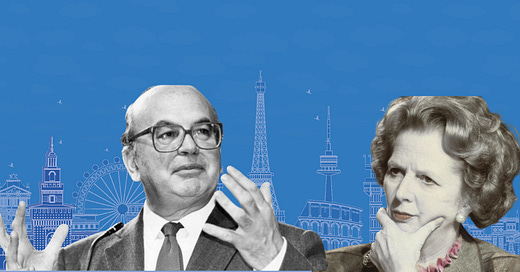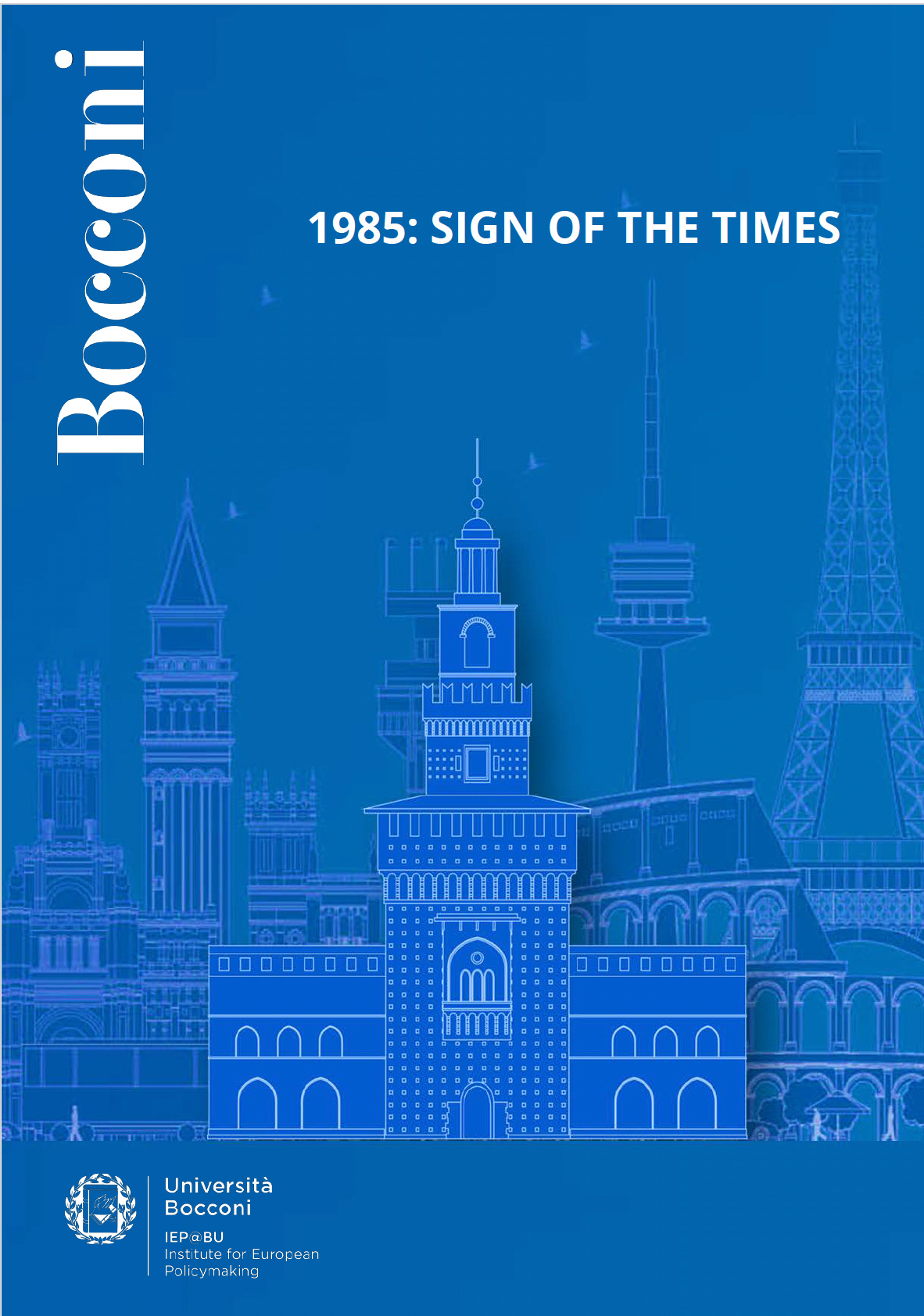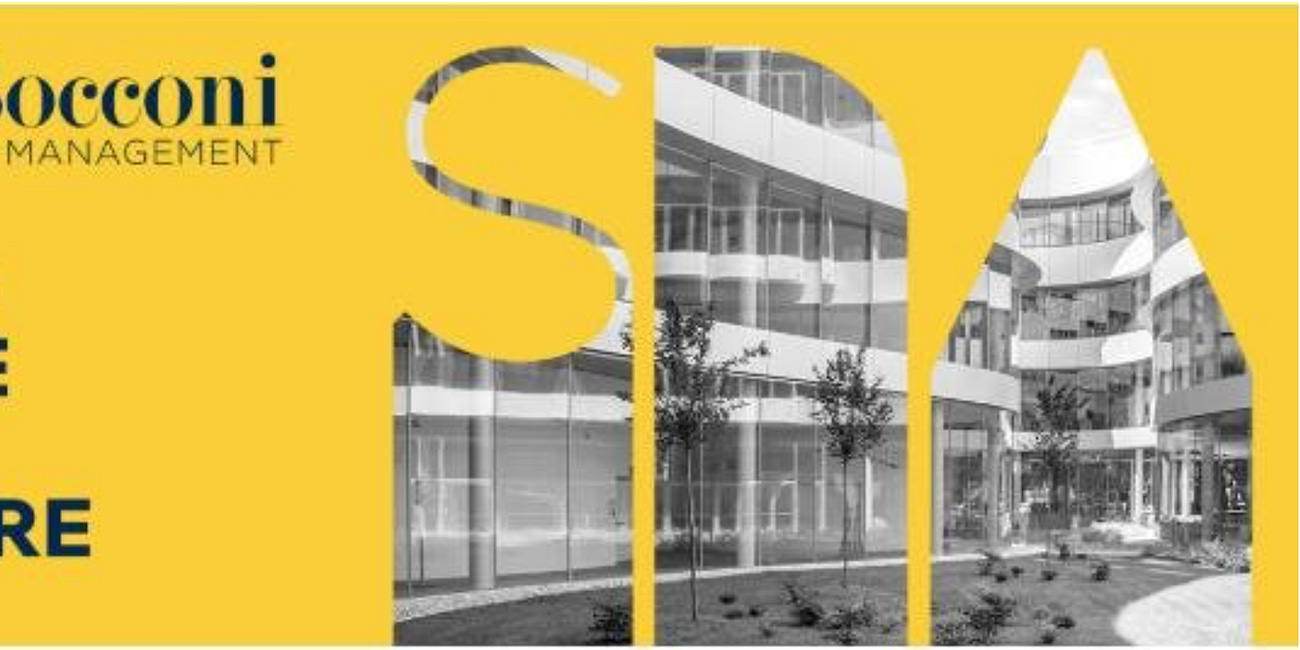Policy Brief - 1985: Sign of the Times
A paper published in the occasion of the 2025 IEP@BU Annual Event: A Bolder European Union - Today’s challenges in the spirit of the 1985 Milan European Council
At the June 1985 European Council meeting, in Milan, the diverging views about the future of Europe – its identity as a common trading area or as a more cohesive bloc – were bound to clash strongly, given the fact that the meeting was intended to consider various proposals for the reform of the European institutions
Download the Policy Brief
Executive Summary
The European Council meeting in Milan at the end of June 1985 can be better understood by examining the perspectives of the then Italian political leadership on Italy's global standing and its role within the emerging European Union, as well as the European leadership's vision of Europe's present and future identity.
Prime Minister Bettino Craxi, a socialist leader, used this opportunity to articulate his views on Italy's global role and its place within the European Community (EC). He advocated for strengthening Europe as a political entity, rather than merely an economic partnership. Craxi's outlook aligned with that of the governing coalition's "Atlanticist" vision, which emphasized cohesion among European countries and the United States through NATO treaties.
At the time, Italy was enjoying economic prosperity. Its GDP per capita was similar to that of the United Kingdom and just slightly below that of France and Germany.
The country had successfully reduced inflation from a peak of 21% in 1980 to just over 4% by the mid-1980s. The trade deficit was diminishing, thanks to the success of "Made in Italy" products from industrial districts. While public debt was rising, it remained manageable and had not yet reached the alarming levels seen in the early 1990s. Italy’s reputation had dramatically improved, both globally and among European partners.
The meeting was characterized by tension, primarily due to resistance from some members, notably the United Kingdom, which had historically opposed transforming the trading area into a more integrated political and economic union. For that to occur, an Intergovernmental Conference (IGC) was necessary.
Even if the European Council was not required to achieve full unanimity in its decisions according to the provisions of the Rome Treaties, consensus had so far been the rule.
However, in order to break the deadlock and proceed with organizing an IGC, the Italian Presidency took the unusual (and unexpected) step of proposing, for the first time, a majority vote on the matter.
The ability to leverage a majority vote under Article 236 of the Rome Treaty facilitated progress, despite the frustration of a characteristically Euro-skeptical Margaret Thatcher about holding an IGC. This was a fundamental move towards the Single European Act and, ultimately, the new European Treaties signed years later in Maastricht in 1992.
The IGC would indeed take place on September 9, 1985, with the support of seven of the ten member states.
A Bolder European Union: Today’s challenges in the spirit of the 1985 Milan European Council
🗓️ Wednesday, June 11, 2025
⏰ 16:00 – 18:00
📍 Castello Sforzesco – Sala della Balla, Piazza Castello, Milano
PLEASE, REGISTER HERE
SPEAKERS
Francesco BILLARI Rector, Bocconi University
Marta CARTABIA Full Professor of Italian and European Constitutional Law, Bocconi University
Catherine DE VRIES President, IEP@BU
Sylvie GOULARD Vice President, IEP@BU
Enrico LETTA Dean, IE School of Politics, Economics & Global Affairs
Mario MONTI Honorary President, IEP@BU
Teresa RIBERA Executive Vice President of the European Commission
Giuseppe SALA Mayor of Milano
CHAIR |
Stefano FELTRI Communication Advisor, IEP@BU
🗓️ Wednesday, June 11, 2025
⏰ 16:00 – 18:00
📍 Castello Sforzesco – Sala della Balla, Piazza Castello, Milano
PLEASE, REGISTER HERE
IEP@BU does not express opinions of its own. The opinions expressed in this publication are those of the authors. Any errors or omissions are the responsibility of the authors.
Sustainability disclosure: red tape or strategic tool for the future of business?
SDA Bocconi - Via Sarfatti 10, Milano
The IEP@BU Mission
Founded by Bocconi University and Institute Javotte Bocconi, the Institute for European Policymaking @ Bocconi University combines the analytic rigor of a research institute, the policy impact of a think tank, and the facts-based effort of raising public opinion’s awareness about Europe through outreach activities. The Institute, fully interdisciplinary, intends to address the multi-fold obstacles that usually stand between the design of appropriate policies and their adoption, with particular attention to consensus building and effective enforcement.
The Institute’s mission is to conduct, debate, and disseminate high-quality research on the major policy issues facing Europe, and the EU in particular, its Member States and its citizens, in a rapidly changing world.
It is independent of any business or political influence.
The IEP@BU Management Council
Catherine De Vries, IEP@BU President
Daniel Gros, IEP@BU Director
Sylvie Goulard, IEP@BU vice-President, Professor of Practice in Global Affairs at SDA Bocconi School of Management
Silvia Colombo, IEP@BU Deputy Director
Carlo Altomonte, Associate Professor at Bocconi University and Associate Dean for Stakeholder Engagement Programs at SDA Bocconi School of Management
Arnstein Assve, Professor in Demography at Bocconi University
Valentina Bosetti, professor of Environmental and Climate Change Economics at Bocconi University
Elena Carletti, Dean for Research and Professor of Finance at Bocconi University
Eleanor Spaventa, Professor of European Union Law at Bocconi Law School










